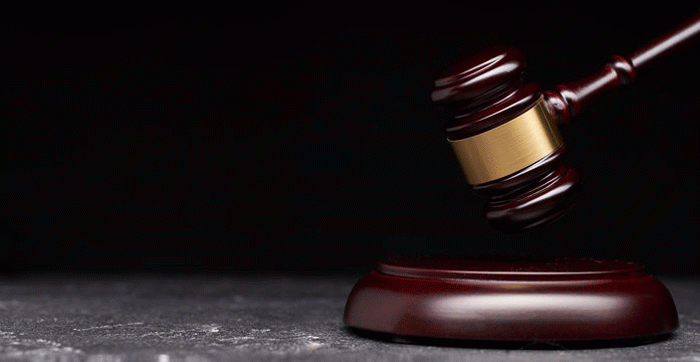
A SUPREME Court bench has dismissed a Bulawayo businessman’s appeal against a 15-year imprisonment sentence imposed by the High Court after they murdered a suspected speaker thief.
The businessman, Simon Tapera, and his accomplices Collen Mukombwe and Norman Tapera had their appeal dismissed by Supreme Court judges Elizabeth Gwaunza, Samuel Kudya and Joseph Musakwa.
The three had appealed against the whole Bulawayo High Court judgment handed down on November 3 last year.
According to court documents, on January 31, 2022, the three invited Tonderai Doka to their shop at Entumbane Complex and severely assaulted him.
They drove Doka, whom they had handcuffed, to his mother Patricia Doka’s house and told her that he had stolen a music speaker from their shop.
Mukombwe kicked and stomped on Doka’s ribs at his mother’s house while they ignored her appeal to take him to hospital.
They later took Doka and his mother to his home, where he stayed with his girlfriend, Sibongile Ndlovu and daughter, but failed to find the speaker.
After that, they took him to Entumbane Police Station, where they reported a theft case, while Doka reported an assault case before he was taken to Mpilo Central Hospital.
- Revisiting Majaivana’s last show… ‘We made huge losses’
- Edutainment mix: The nexus of music and cultural identity
- ChiTown acting mayor blocks election
- Promoter Mdu 3D defends foreigners 30 minute set
Keep Reading
Doka succumbed to his injuries a week later.
In court, the three pleaded not guilty to murder, arguing that Doka had been assaulted by members of the public.
Doka’s girlfriend, Ndlovu, however, testified that they were invited by the appellants to have a stroll at Entumbane Shopping Complex before they took him to the basement of the shop.
Ndlovu said she waited for Doka for some time and later called on his cellphone, but the call was terminated immediately after being answered and thereafter, further calls were unsuccessful.
She told the court that she saw him the next day at Mpilo Central Hospital and noticed that he had soiled himself and was unable to talk.
His head was swollen, the skin was peeling off at the back like it had been burnt and the feet were swollen and bleeding, the court heard.
Doka’s mother testified that when the trio brought him to her residence, he was severely injured.
She told the court that she pleaded with them to take him to hospital, but they refused before Mukombwe threatened to whip her with a sjambok.
Doka pleaded with her not to leave fearing that if she did the trio would kill him.
Three police officers testified that Doka informed them that he had been assaulted by the trio at their shop and not the public.
A government pathologist, who conducted a post-mortem, testified that he observed multiple bruises on the back, upper limbs, swollen neck and face.
He also observed wounds on the dorsal surface of the right foot, lesions on the shoulder and neck.
The pathologist associated the injuries that he observed with torture.
Norman Tapera, a security guard at the shop denied killing Doka.
He said during lunch hour, Doka walked into the shop and grabbed the speaker and dashed out before he gave chase and an alert member of the public tripped him.
He said a mob of irate passersby pounced on him and meted out instant justice before he intervened and called his brother, Simon, after Doka confessed to the theft.
The testimony was corroborated Mukombwe and Simon.
The High Court, however, ruled that the trio’s evidence was untruthful, adding that the trio assaulted Doka in the basement of the shop, leading to his death and that the medical evidence unequivocally showed that the cause of death was assault.
Aggrieved by the conviction and sentence, the trio filed an appeal before the Supreme Court on ground that the offence of murder was not proven.
Advocate Tawanda Zhuwarara, who represented the trio, submitted to the Supreme Court bench that a charge of murder was not proven as the accused believed that they were disciplining a thief.
Zhuwarara argued that the High Court judgment lacked a specific finding.
The State opposed the appeal saying the charge was clear and specific as to what charge they were facing.
In analysing the appeal, the judges said the totality of the evidence presented unequivocally supported a conviction of murder.
“The severity and nature of the injuries, as described by medical report and observed by medical personnel, as well as the witnesses indicate that the appellants assaulted the deceased with a level of brutality that inherently carried a high risk of causing death.
“The medical evidence establishes a direct causal link between the assault and the deceased’s death. The multiple injuries demonstrate that the assault was the proximate cause of death.
“The fact that the deceased developed such life-threatening conditions as a direct result of the assault underscores the serious nature of the attack and the substantial risk of death inherent in the appellants’ actions,” the judges ruled.
They said the evidence proved beyond reasonable doubt that the appellants, through their actions, foresaw or realised that there was a substantial risk of causing death and continued assaulting him regardless of that risk.









